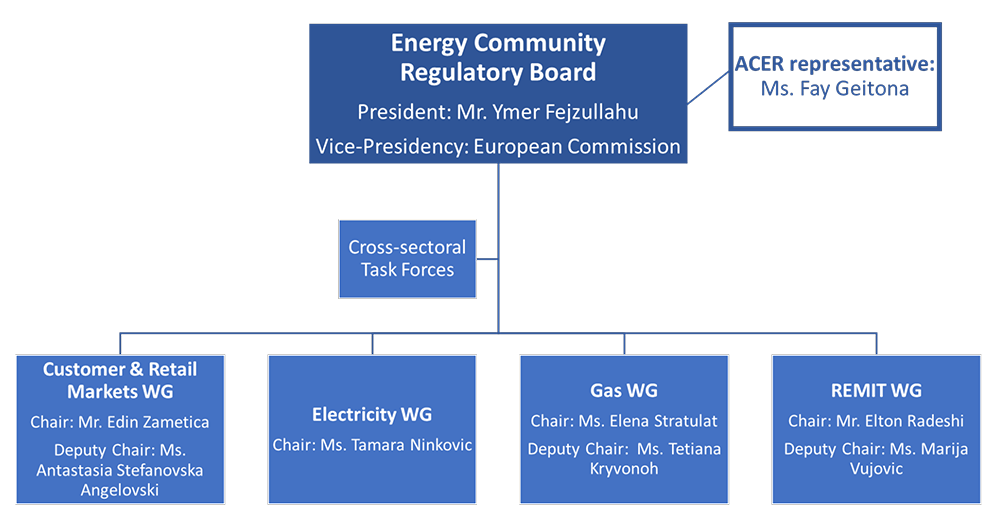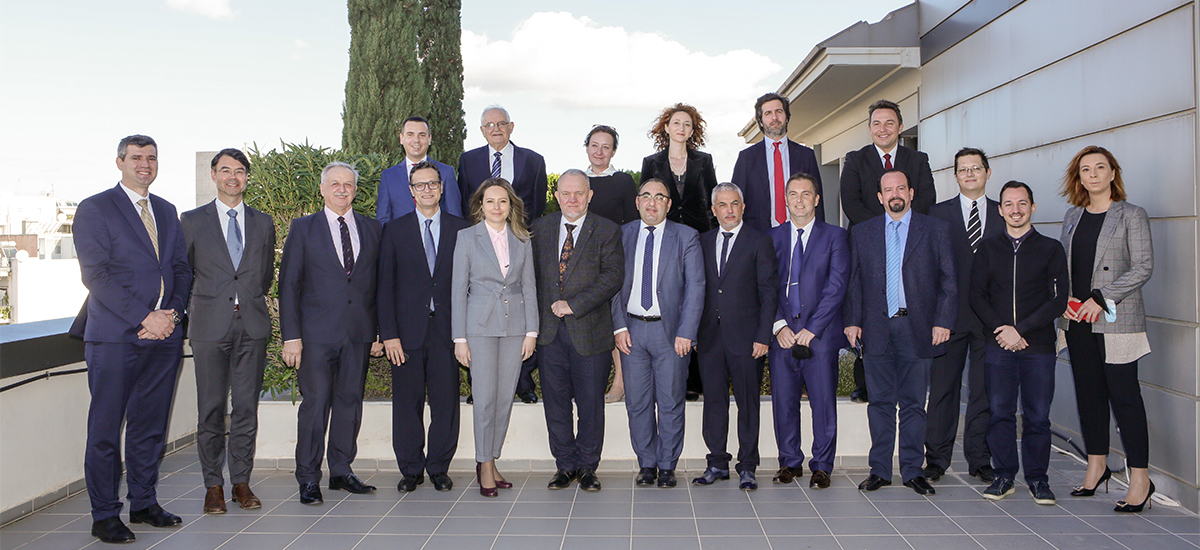The Energy Community Regulatory Board (ECRB) is the independent regional body of energy regulators in the Energy Community and beyond. It is the coordination platform for exchange of knowledge and development of best practices for regulated electricity and gas markets in the Energy Community. Its activities are built on three pillars: providing coordinated regulatory positions to energy policy debates, harmonizing regulatory rules across borders and sharing regulatory knowledge and experience.
-
Composition
Composition

The ECRB is composed of high-level representatives from the national energy regulatory agencies of the Energy Community Contracting Parties, Observers and Participants. The Board elects its President for a two-year term. The current president is Mr. Ymer Fejzullahu, President of the Energy Regulatory Office of Kosovo. The European Union, represented by the European Commission, acts as Vice-President and is assisted by the Agency for the Cooperation of Energy Regulators (ACER).
The key four pillars of ECRB activities are organised in four corresponding working groups. Under this general set up, the Customers and Retail Markets Working Group covers retail market and customer protection related aspects of the electricity and gas sectors, while the Electricity Working Group and Gas Working Group focus on wholesale related aspects of the relevant energy sectors. The REMIT Working Group deals with regulatory and ECRB duties stemming from the REMIT Regulation.Cross-sectoral ECRB activities, such as Opinions on preliminary certification decisions of Contracting Parties’ national regulatory authorities (NRA) or on Projects of Energy Community Interests (PECI), are addressed by dedicated task forces before their submission for decision by the ECRB.
-
Tasks
Tasks
The Energy Community Regulatory Board (ECRB) operates based on the Treaty establishing the Energy Community. As an institution of the Energy Community, ECRB advises the Ministerial Council and Permanent High Level Group on details of statutory, technical and regulatory rules and makes recommendations in the case of cross-border disputes between regulators. ECRB can also provide an Opinion to the Energy Community Secretariat on preliminary certification decisions of Contracting Parties’ regulators and is in charge of providing an opinion of network code regulations prior to their adoption by the Permanent High Level Group.

50th ECRB meeting, 30 November 2021, AthensFurther to this, ECRB gained a number of new monitoring competences in context with the implementation of gas and electricity network code regulations and the Electricity Market Integration Package. Activities related to monitoring of retail markets, supporting customer empowerment as well as integrating electricity and gas wholesale markets in the Energy Community form the backbone of the ECRB activities. The ECRB also supports the regulators in enforcing the new competences arising from adoption of Regulation (EU) 1227/2011 on wholesale energy market integrity and transparency (REMIT) in 2018.
Sharing best practice experience with other regional regulatory bodies is beneficial not only for promoting effective and efficient regulatory conduct, but also for supporting the goal of integrating regional energy markets. ECRB is committed to continue and strengthen the well-established streams of cooperation with the Agency for the Cooperation of Energy Regulators (ACER), the Council of European Energy Regulators (CEER) and the Association of Mediterranean Regulators (MedReg). Specific cooperation formats are outlined in the programs of the individual working groups.
The Regulatory Board is supported by the ECRB section of the Energy Community Secretariat seated in Vienna.
Filters:
Document Name Published on 16.05.202429.12.2023- ECRB monitoring
ECRB and Market Monitoring
Market monitoring is a core element of regulatory responsibilities. Only in-depth knowledge of market performance and stakeholder activities allow regulators to create an effective market framework that balances the needs of market players. As of 2015 ECRB prepares Market Monitoring Reports assessing the functioning of gas and electricity retail and wholesale markets in the Energy Community Contracting Parties. This complements the input provided by Contracting Parties’ NRAs to the annual market monitoring report of ACER-CEER on retail market developments that is prepared in cooperation with the Energy Community Secretariat.
Market Transparency Monitoring
Gas Regulation (EC) 715/2009 defines a comprehensive list of publication requirements in the gas sector. For electricity a dedicated Regulation (EU) 543/2013 stipulates detailed transparency obligations for data owners. ECRB assesses and reports on the level of compliance in the Contracting Parties with the related duties stemming from the Energy Community acquis communautaire.
ECRB publishes also a matrix which outlines each data set that is required to be published by the Regulation 543/2013 and if such information is published and where. This will be updated on ad-hoc basis by members of the ECRB.
SEEAMMS
USAID supported development of the so-called South East Europe Automated Market Monitoring System (SEEAMMS). SEEAMMS allows the TSOs to upload data to a web-based interface where the data is stored, processed, and reported to regulators. SEEAMMS operates on regional basis with regulators acting as the regional monitor centre on a rotating basis.
Other regular monitoring
ECRB electricity cross-border transmission capacity monitoring reports are published on bi-annual basis covering periods from January to June and July to December of each year.
Electricity Cross-Border Transmission Capacity Monitoring In the context of its Market Monitoring for South East Europe project, United States Agency for International Development (USAID) supported the Energy Community national regulatory authorities in developing common standards for monitoring the activities of electricity transmission system operators (TSOs).
Guidelines This resulted in development of the so-called South East Europe Market Monitoring Guidelines approved by ECRB in 2014. The purpose of the Guidelines is to harmonize and coordinate the activities of regulators in monitoring TSOs with the aim to ensure that network users are granted access to the maximum amount of electricity transmission cross border capacity on a non-discriminatory basis. - ECRB monitoring
